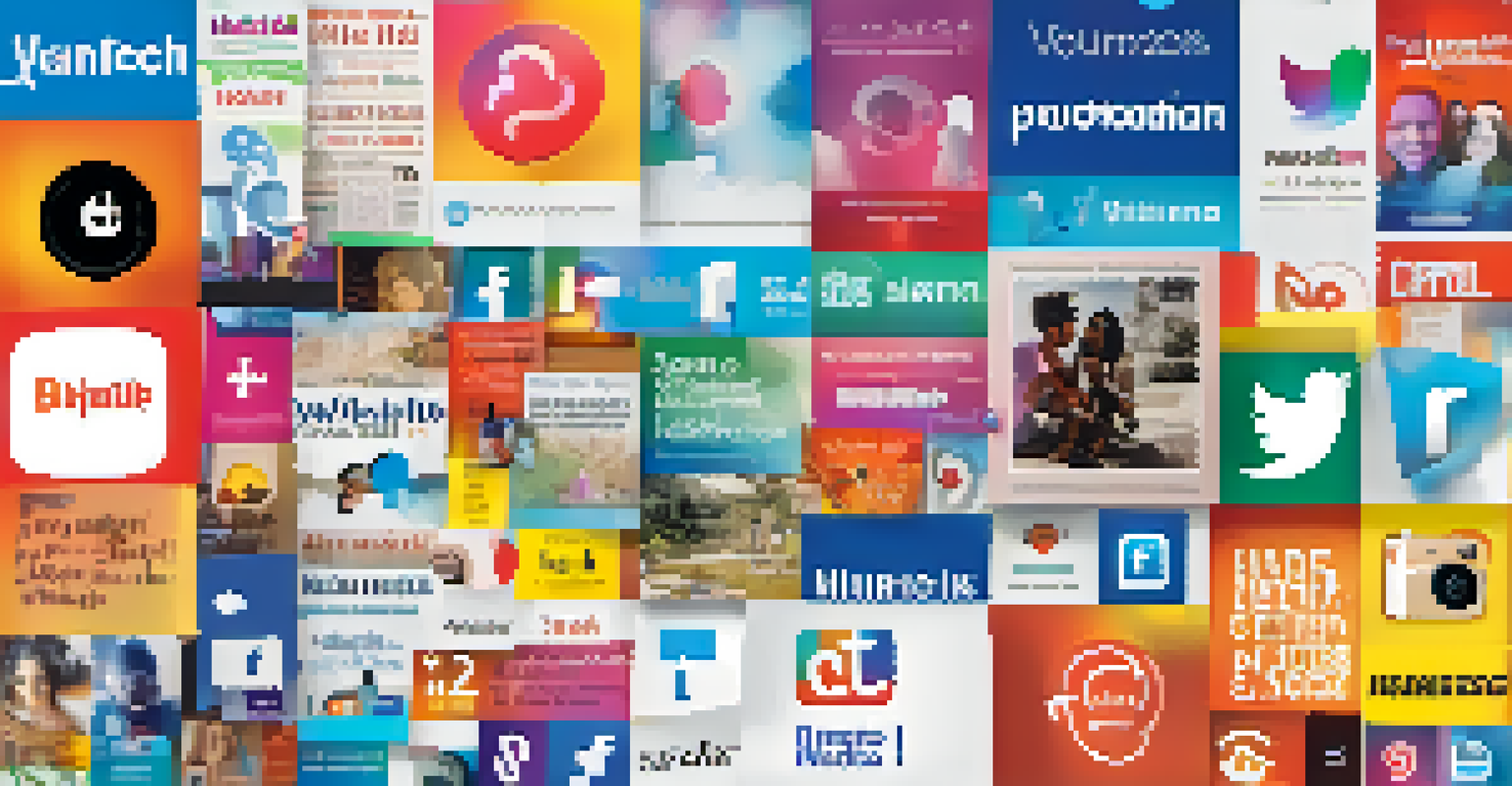Exploring Social Media's Role in Mental Health Awareness

Understanding Social Media's Influence on Mental Health
Social media has woven itself into the fabric of our daily lives, shaping how we communicate and connect. Its influence extends beyond social interactions, playing a pivotal role in mental health awareness. The platforms allow individuals to share their stories, experiences, and struggles, fostering a sense of community and understanding.
Social media is not just a tool; it’s a platform for connection and understanding, especially in the realm of mental health.
For many, scrolling through their feeds can feel like a double-edged sword. While it provides a space for support, it can also expose users to negativity and unrealistic portrayals of life. However, when used mindfully, these platforms can be powerful tools for promoting mental well-being and destigmatizing mental health issues.
In essence, social media can act as a megaphone for mental health advocacy, amplifying voices that might otherwise go unheard. It encourages open dialogue and educates users about mental health challenges, creating a more informed and empathetic society.
The Rise of Mental Health Communities Online
One of the most significant benefits of social media is the emergence of supportive communities focused on mental health. Platforms like Facebook and Reddit host groups where individuals can connect over shared experiences. These communities offer a safe space for users to discuss their feelings, share coping strategies, and find solace in knowing they are not alone.

For example, hashtags such as #MentalHealthAwareness and #EndTheStigma have united countless individuals, enabling them to rally for change and share resources. These movements not only raise awareness but also encourage individuals to seek help and support when needed. This collective effort fosters a sense of belonging and reduces feelings of isolation.
Social Media Supports Mental Health
Social media platforms foster supportive communities that help individuals share their mental health experiences and reduce feelings of isolation.
Ultimately, these online communities serve as lifelines for those grappling with mental health challenges. The connections formed within these spaces can lead to lasting friendships and support systems that enhance well-being and resilience.
The Role of Influencers in Promoting Mental Health
Influencers have become key players in shaping conversations around mental health on social media. By openly discussing their own struggles, they humanize mental health issues and encourage followers to seek help. Their authenticity can inspire vulnerability, making it easier for others to relate and share their own experiences.
The greatest gift you can give someone is your time and attention, and social media has the power to enhance that gift in the mental health community.
Take, for instance, celebrities who have candidly addressed their mental health journeys. Their willingness to speak out not only normalizes these discussions but also empowers fans to prioritize their well-being. This creates a ripple effect, where followers feel motivated to advocate for mental health awareness within their own circles.
In this way, influencers can serve as catalysts for change, using their platforms to spread positivity and support. Their impact highlights the importance of representation and connection, reminding us that mental health is a universal issue that affects us all.
Social Media Campaigns Raising Mental Health Awareness
Various social media campaigns have emerged to spotlight mental health issues and encourage open discussions. Movements like #BellLetsTalk and #WorldMentalHealthDay aim to destigmatize mental health conversations and promote understanding. These campaigns often encourage users to share their stories and support each other, fostering a culture of openness.
Through engaging visuals, poignant storytelling, and relatable content, these campaigns capture attention and inspire action. They often include calls to action, urging followers to participate in discussions or donate to mental health organizations. This not only raises funds but also cultivates a sense of community and shared purpose.
Influencers Drive Mental Health Dialogues
Influencers play a crucial role in normalizing mental health discussions by sharing their personal struggles, inspiring their followers to seek help.
Ultimately, these campaigns remind us that everyone has a role to play in promoting mental health awareness. By increasing visibility and facilitating conversations, they create a supportive environment where individuals feel empowered to seek help and support.
Navigating the Challenges of Social Media and Mental Health
While social media offers numerous benefits for mental health awareness, it also presents challenges. The constant influx of information can be overwhelming, leading to feelings of anxiety or inadequacy. Additionally, exposure to negative comments or cyberbullying can exacerbate mental health struggles for vulnerable individuals.
It's essential to strike a balance between engagement and self-care. Users should be mindful of their social media consumption, recognizing when to take a step back if it becomes detrimental to their mental health. Setting boundaries, such as limiting time spent online or curating feeds to include only positive influences, can help create a healthier experience.
By understanding these challenges, individuals can navigate social media more effectively. Practicing self-awareness allows users to engage with content that uplifts and supports their mental health journey.
The Importance of Authenticity in Online Interactions
Authenticity plays a crucial role in how mental health is discussed and perceived on social media. Users are drawn to genuine stories and interactions, and when individuals share their true selves, it fosters trust and connection. This authenticity encourages others to open up and share their own experiences, leading to more meaningful conversations.
However, it's essential to recognize that social media often highlights curated versions of life. This can lead to unrealistic expectations and comparisons, which may negatively impact mental health. Being aware of this disparity allows users to appreciate the authenticity of others while also embracing their own unique journeys.
Campaigns Boost Mental Health Awareness
Social media campaigns like #BellLetsTalk raise awareness and promote open discussions about mental health, encouraging individuals to seek support.
Encouraging authentic interactions not only enhances individual well-being but also strengthens the online community. When users embrace vulnerability, they contribute to an environment that values honesty and support, ultimately driving the conversation around mental health forward.
Future Trends in Social Media and Mental Health Awareness
Looking ahead, the role of social media in promoting mental health awareness is likely to evolve. As more individuals recognize the importance of mental well-being, we can expect to see an increase in content dedicated to these topics. Platforms may also introduce features that prioritize mental health, such as resources or tools for users seeking help.
Innovative technologies, like virtual reality and AI, may also play a role in enhancing support systems. These advancements could provide new avenues for connection and understanding, allowing individuals to engage with mental health resources in more immersive ways. The potential for increased accessibility is promising.

Ultimately, the future of social media and mental health awareness is bright. As conversations continue to unfold, we can anticipate a culture that values mental health and encourages individuals to thrive, transforming social media into a platform for healing and support.